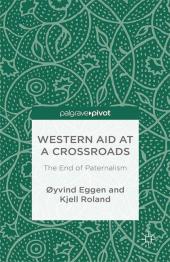 Neuerscheinungen 2014Stand: 2020-02-01 |
Schnellsuche
ISBN/Stichwort/Autor
|
Herderstraße 10
10625 Berlin
Tel.: 030 315 714 16
Fax 030 315 714 14
info@buchspektrum.de |

O. Eggen, K. Roland
(Beteiligte)
Western Aid at a Crossroads
The End of Paternalism
1st ed. 2014. 2014. xii, 124 S. 216 mm
Verlag/Jahr: SPRINGER PALGRAVE MACMILLAN; PALGRAVE MACMILLAN UK 2014
ISBN: 1-349-47922-5 (1349479225)
Neue ISBN: 978-1-349-47922-1 (9781349479221)
Preis und Lieferzeit: Bitte klicken
The new growth patterns and shifting wealth in the world economy fundamentally alter the basis for Western aid. This book demonstrates how Western development aid has been transformed over time, in particular in the 1990s, when the West enjoyed world hegemony. Western aid, once a helping hand to other countries´ development strategies, has increasingly been seen as a tool for large-scale attempts to transform states, societies and minds according to Western models. The authors claim that this has made aid more complex and less useful to poor countries in their fight against poverty.
Emerging economies, such as China, have demonstrated that other paths to growth and poverty alleviation are available. They are attractive partners in development, offering collaboration without paternalism. Most poor countries experience growth, and are able to finance development with homegrown resources or in collaboration with non-Western partners. Having other options, they may increasingly challenge and reject Western aid if it is accompanied with goals of transforming the recipients based on Western blueprints.
The authors claim that aid has a role in the fight against poverty in the future, but only if Western donors are willing to adapt to the new world order, leave paternalism behind and rethink their role in development. Donors must change the way they relate to poor sovereign states, redefine the meaning of ´development´, and reinvent aid to make it simpler and more manageable.
Introduction 1. The History of Aid Paradigms 2. A journey into the unknown 3. The knowledge gap 4. What can aid do? 5. The new world order 6. The future of aid
yvind Eggen is the Policy Director for Evaluation at the Norwegian Agency for Development Cooperation (Norad). He holds a PhD in Development Studies and was previously Senior Researcher at the Norwegian Institute of International A airs (NUPI) and International Law and Policy Institute (ILPI), where he specialized in the effects of foreign aid.
Kjell Roland is CEO of the Norwegian Investment Fund for Developing Countries (Norfund). He founded and worked as partner and CEO in the consulting company Econ for over two decades. As a consultant, he worked with development, energy and environmental issues for companies, governments and international organizations.


